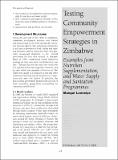| dc.contributor.author | Lenneiye, Mungai | en |
| dc.date.accessioned | 2016-02-01T14:49:30Z | |
| dc.date.available | 2016-02-01T14:49:30Z | |
| dc.date.issued | 01/01/2000 | en |
| dc.identifier.citation | Lenneiye, M. (2000) Testing Community Empowerment Strategies in Zimbabwe: Examples from Nutrition Supplementation, and Water Supply and Sanitation Programmes. IDS Bulletin 31(1): 21-29 | en |
| dc.identifier.issn | 1759-5436 | en |
| dc.identifier.uri | https://opendocs.ids.ac.uk/opendocs/handle/20.500.12413/8824 | |
| dc.description.abstract | Summary This article provides a brief overview and examples of how communities were involved in feeding programmes during years of drought in Zimbabwe, and in the management of rural water supply and sanitation programmes throughout the 1980s. The balance between political and technical demands in the implementation of these programmes indicates that they started off with community interests at the centre, but gradually gave way to the needs of the bureaucracy (both political and administrative). The main lessons to be learnt from these programmes is that information on entitlements and obligations (on the part of communities and external agencies) is a prerequisite for successful community development projects. Furthermore, the extent of accountability to communities is directly proportional to progress made towards the devolution of power to democratic development structures, be they directly or indirectly elected. | en |
| dc.format.extent | 9 | en |
| dc.publisher | Institute of Development Studies | en |
| dc.relation.ispartofseries | IDS Bulletin Vol. 31 Nos. 1 | en |
| dc.rights.uri | http://www.ids.ac.uk/files/dmfile/IDSOpenDocsStandardTermsOfUse.pdf | en |
| dc.title | Testing Community Empowerment Strategies in Zimbabwe: Examples from Nutrition Supplementation, and Water Supply and Sanitation Programmes | en |
| dc.type | Article | en |
| dc.rights.holder | © 2000 Institue of Development Studies | en |
| dc.identifier.doi | 10.1111/j.1759-5436.2000.mp31001003.x | en |

